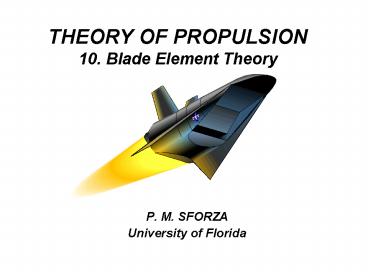THEORY OF PROPULSION 10' Blade Element Theory - PowerPoint PPT Presentation
1 / 36
Title:
THEORY OF PROPULSION 10' Blade Element Theory
Description:
Quasi-two-dimensional flow in an infinitesimal annular cylinder. Theory of Propulsion ... Turning and axial forces from lift and drag forces. Theory of Propulsion. 8 ... – PowerPoint PPT presentation
Number of Views:275
Avg rating:3.0/5.0
Title: THEORY OF PROPULSION 10' Blade Element Theory
1
THEORY OF PROPULSION 10. Blade Element Theory
- P. M. SFORZA
- University of Florida
2
Quasi-two-dimensional flow in an infinitesimal
annular cylinder
3
Force field on blade element
4
Circulation-based lift
Frictionless flow in straight cascades gave the
following result
5
Combined velocity diagram
w2 wm w3 ca
c2 c3
b2 bm b3
a2 a3
w3u
wmu
w2u
6
Force field geometry
e
bm
7
Turning and axial forces from lift and drag forces
8
Momentum and blade theory compared
Blade element theory
Cascade momentum analysis for frictionless flow
9
Combination of momentum and blade element analyses
10
Power and the blade element results
Assuming a constant average density for the flow
in the stage yields
11
Degree of reaction
The parameter fca/u is a typical measure of mass
flow through the stage
12
R and the mass flow function f
where
13
Influence of the trailing edge
14
Influence of the trailing edge (cont.)
constantB
f ca/u determines r
15
The pressure coefficient y
where
The pressure coefficient is
16
Pressure coefficient vs mass flow coefficient
Typical range for lightly loaded stage
compressors
fans
17
Non-dimensional combined velocity diagrams
rrfrictionlessfcotbm
18
Rotor and stator forces
19
The deflection coefficient t
From the combined velocity diagram we see that
Adding or subtracting yields
20
The theoretical degree of reaction r
21
Rotor and stator forces
22
Rotor and stator forces (cont.)
23
Pressure change across rotor and stator with
friction
24
Power required
25
Efficiency of compression
26
Maximum efficiency
erese
27
Contour plot of efficiency
28
Problem 12 50 stage turbine
12. A 50 reaction stage axial flow turbine with
u366m/s at the mean line of the rotor where
d76.2cm has Tt1144K and pt687kPa entering the
stator from the combustor The blade angle a425o.
29
Problem 12 combined velocity diagram
WuDcuu(c4u c5u)(1/2)(c42-c52) (w42-w52)
30
Problem 12 Work extracted by turbine
Because c4w5 and c5w4 either equality holds
W (c42-w42) u(c4cosa4-w4cosb4)
And since w4cosb4u-c4cosa4
W u(2c4cosa4-u) c422(u/c4)cosa4 (u/c4)2
W/c42 2hbcosa4 hb2
hbu/c4
Where the blade efficiency
31
Problem 12 Temperature leaving rotor
Maximum efficiency occurs when hbcosa4 or u
c4cosa4
Wmax. blade eff. c42cos2a4 u2
Wmax. blade eff. (366m/s)2134kJ/kg
Wcp(Tt4-Tt5) (1.16kJ/kg-K)(1144K-Tt5)134kJ/kg
Tt51029K
32
Problem 12 Flow properties
T4 Tt4 c42/2cp 1144K (404m/s)2/2(1160m2/s
2-K) 1074K a4 (gRT4)1/2 (1.33287m2/s2-K1
074K)640m/s M4 (404m/s)/(640m/s) 0.631 M4
(171m/s)/(640m/s) 0.267 (relative to rotor at
rotor exit) T5 Tt5 c52/2cp 1029K
(171m/s)2/2(1160m2/s2-K) 1016K a5 (gRT5)1/2
(1.33287m2/s2-K1016K)622m/s M5(171m/s)/(622
m/s)0.275 M5(404m/s)/(622m/s) 0.649
(relative to rotor at rotor exit)
33
The isentropic relation yields
p4 pt410.5(g-1)M42 -g/(g-1) 685kPa1M42/6
-4 532kPa
The equation of state yields
r4p4/RT4(532kPa)/(0.287kJ/kg-K)(1074K)
1.73kg/m3
The conservation of mass requires
mr4Aca4 r5Aca5
34
Problem 12 Mass flow and power
p5 r5RT5(1.73kg/m3)(0.287kJ/kg-K)(1016K) 504kPa
pt5 p510.5(g-1)M52 g/(g-1) 504kPa1M52/6 4
529kPa
Flow area A0.95p(ro2-ri2)0.95p(0.3810.0635)2-
(0.381-0.0635)20.304m2 Mass flow through the
turbine mr4Aca4 r4(0.304m2)ca(1.73kg/m3)(0.30
4m2)(171m/s) m 85.3 kg/s Power developed by
the turbine is PmW (134kJ/kg)(85.3kg/s)11.45M
W
35
Problem 12 Flow properties through the blade
passage
36
GE CF6-50 Characteristics
Low pressure turbine P43.6MW High pressure
turbine P51.7MW Core mass flow
m125kg/s Fan mass flow m540kg/s Burner exit
temperature Tt42940R
Used on Boeing B747 and Airbus A300

